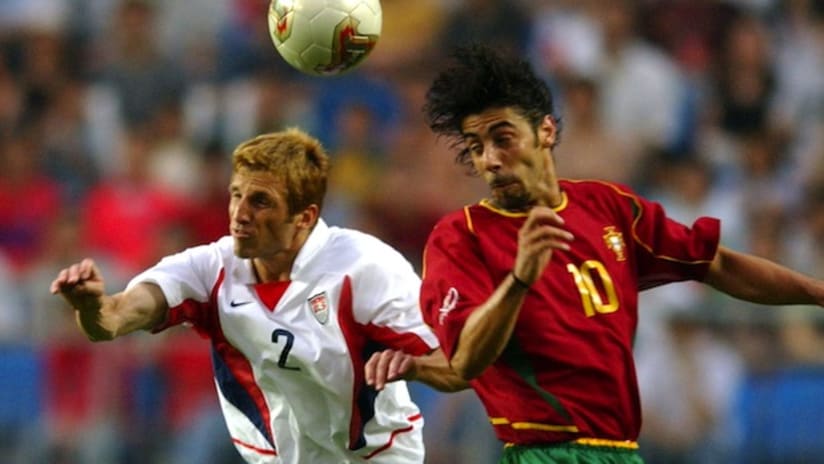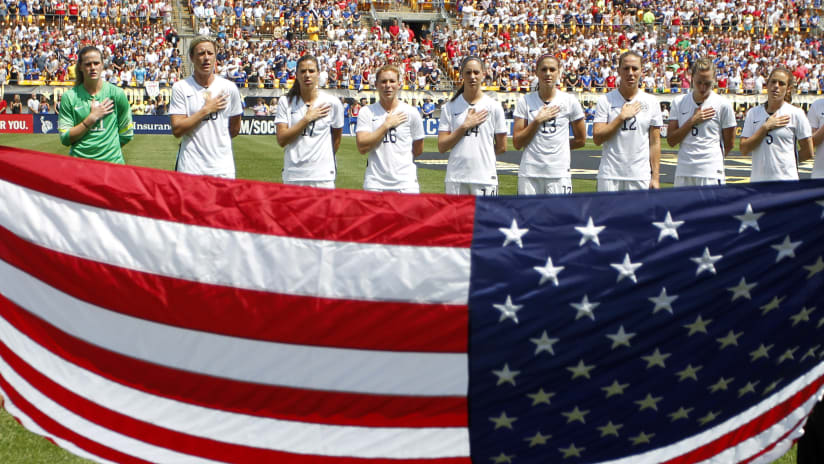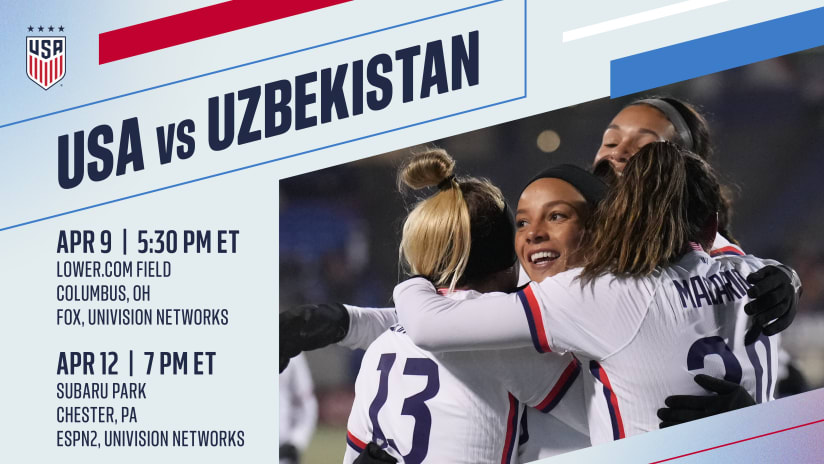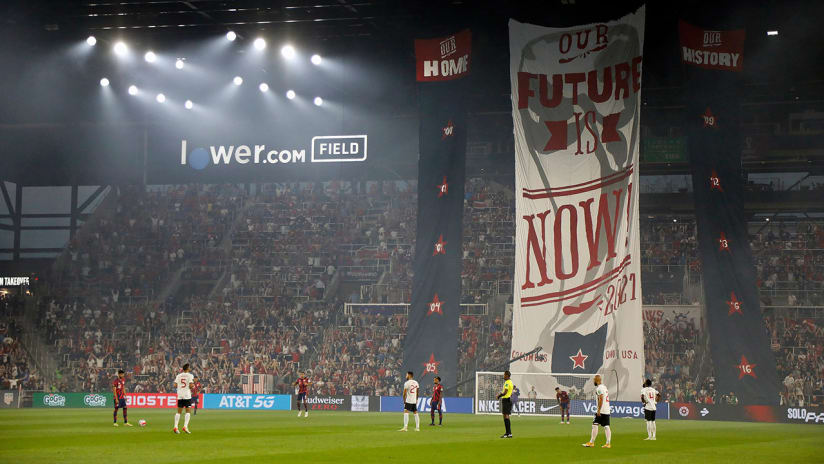On Sunday, the U.S. Men’s National Team takes the field against world power Portugal in its second match of the 2014 FIFA World Cup in Brazil.
Though the U.S. kicked-off its 2014 campaign with a 2-1 win over Ghana, the similarities that led up to the USMNT’s shocking upset of the Portuguese to begin the 2002 FIFA World Cup are striking.
Like 2002, Portugal is a top five team in the world with its number four ranking. Just as it was in 2002 with Real Madrid's Luis Figo, the U.S. looks to shutdown a reigning Ballon D’Or winner from Real Madrid in the dynamic Cristiano Ronaldo. And just as it was in 2002, it would largely be considered a stunning result if the U.S. prevailed over the Portuguese.
As part of TheCrew.com’s Black & Gold on Brazil coverage, members of the 2002 U.S. Men’s National Team and current Crew staff Gregg Berhalter, Frankie Hejduk and Josh Wolff look back on the USMNT’s monumental win in South Korea 12 years ago.
*
Following a disappointing performance at the 1998 FIFA World Cup in France that saw the United States defeated in each of its three Group Stage matches against Germany, Iran and Yugoslavia, the Yanks sought redemption at the 2002 tournament in South Korea-Japan. Reinvigorated by Bruce Arena’s appointment as Head Coach in October 1998, the U.S. went to Asia focused on restoring pride to the American soccer landscape.
That task would not be an easy one as the Americans were drawn into Group D with host South Korea, a Poland side that won its qualifying group in UEFA and fifth-ranked Portugal led by reigning Ballon D’Or winner Luis Figo.
Even before a ball was kicked, advancement out of the group seemed grim. But a prepared and determined Arena along with a squad comprised of the perfect mix of experience, youth, charisma and chemistry didn’t see it that way.
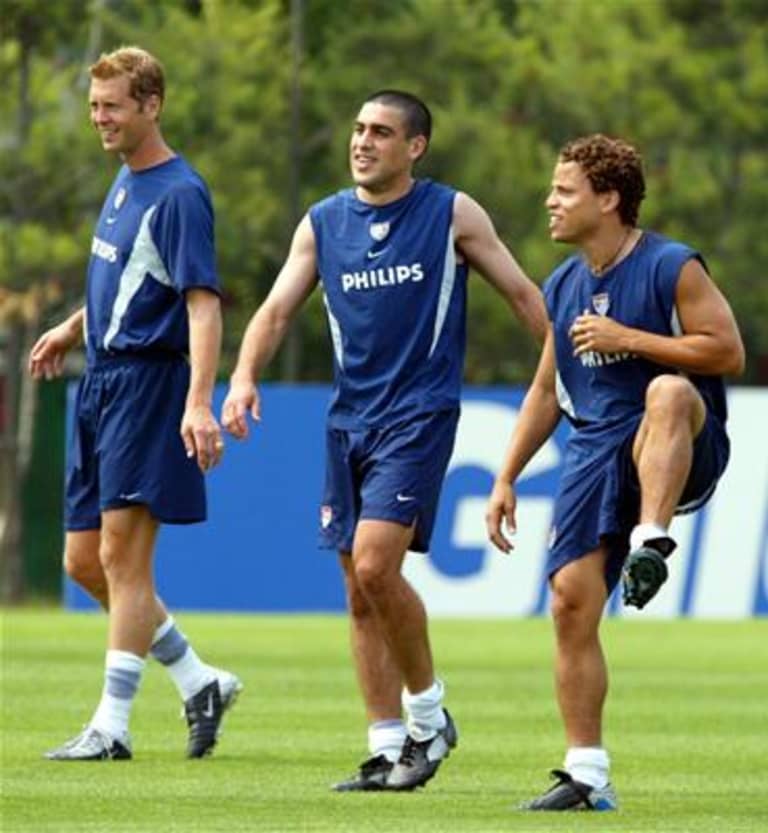
“Bruce changed the mindset early on when he took over,” says Berhalter. “Leading up to the World Cup, we were a completely different team than we were in '98. Bruce did a good job of making us earn everything we got, and by that time we got a lot. The bonuses were different; the travel was different. Everything was different, but we earned it. I think that going into that World Cup, we felt like we could do anything. We felt that on any given day, we could beat any team.
“There were a lot of positive thoughts going into that tournament.”
Arena and his staff put together a squad of veterans such as Claudio Reyna and Brian McBride, established professionals like Berhalter, Hejduk and Wolff and a pair of 20-year-old up-and-comers named Damarcus Beasley and Landon Donovan. The duo helped the U.S. to a fourth-place finish at the 1999 FIFA Under-17 World Cup in New Zealand, in which Donovan was named the Best Player of the tournament.
“We had a great group with a fantastic blend of players,” Wolff recalls. “From very little experience to the mid-level guys and senior-level player that had been there and done it for a while.
He continues: “It was a great blend of players that were coming along and some that were at the latter stages of their careers.
“We had a mindset within the group of what it would take to compete against the best teams in the world.”
In addition to the chemistry within the squad, Arena went to extra lengths to make sure his players were comfortable on the other side of the world.
“The big difference was the family atmosphere around the team,” reflects Hejduk. “Bruce let us bring all our families to the World Cup. He was criticized by everyone in the world, 'Why the heck are you bringing families to stay in the same hotel as the team? That's insane.' But you know what? It fit, because all the families got along together and went out every night.”
Hejduk goes on: “The team was a true team. Every single person, there wasn't one guy bigger than anybody else on the team. We bonded like you need to to make a run in the World Cup. You're not going to make a run in the World Cup unless you have a good team. One or two players can sometimes do stuff individually, but not for us. As Americans in that time, we needed to be together. Bruce had that team as fit as we could be, as loose as we could be. With all the guys and personalities on that team, they really put together a team that everyone really got along on and off the field.”
Heading into the Americans' first match against Portugal, the chemistry was there. The belief was there. But would it be enough to knock off Figo and Portugal?
*
Ranked fifth in the world with a superstar in Figo leading the way, the pressure was on Portugal to deliver its first World Cup in 2002. For a U.S. side that qualified third in CONCACAF, the story couldn’t have been more different.
“I think Portugal wasn't ready to handle the pressure of being a favorite,” Berhalter recalls. “That played to our advantage. We were ready to play the role of the underdog. That combination worked in our favor.”
Studying the Portuguese style in the months leading up to the tournament, Arena instilled a belief in his squad heading into the country’s opening match at the Suwon World Cup Stadium in South Korea.
“We had a mindset within the group of what it would take to compete against the best teams in the world,” Wolff says. “I don't think there was any real fear in us playing any of these teams. There was excitement and encouragement all along from with in our group, and Bruce emphasized that we had to believe in this. We can beat all these teams, but we have to do the work and do the business in each game that comes your way.”
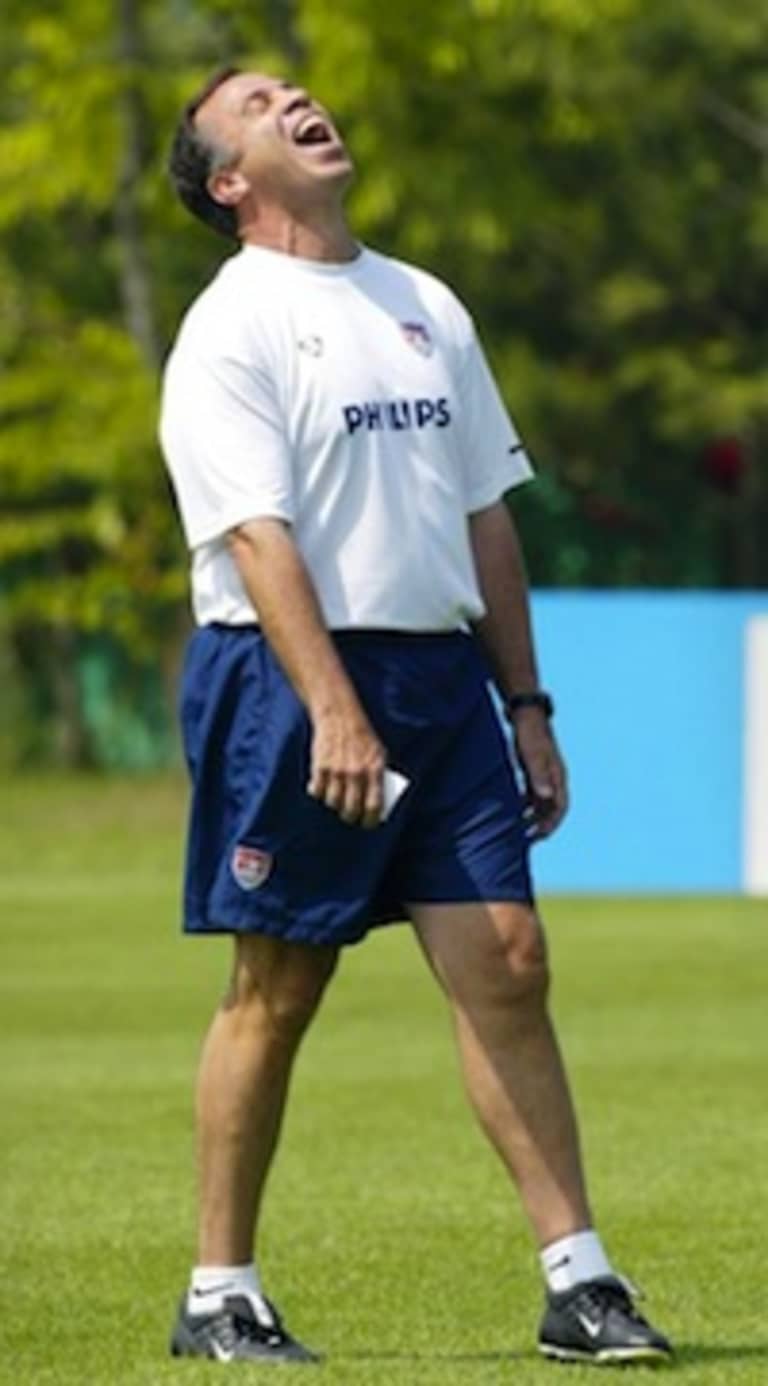
Hejduk agrees: “The Portugal match comes and BAM! The world is expecting us to get crushed. We never thought that, because we were as fit as we could be. All the players liked each other and got along. We were ready. We were more ready for that game than I think I've ever been. We knew what they were going to throw at us.
“We had no nerves," continues Hejduk. "Just amps.”
Arena enlisted the then-Bayer Leverkusen wing player Hejduk to play just his second match at leftback for the USMNT. His task: shutting down defending FIFA World Player of the Year Luis Figo on Portugal’s flank.
“Bruce knows what he gets in Frankie, and he had full confidence in Frankie defensively to be able to handle the responsibility,” Berhalter said of the player-coach relationship between Hejduk and Arena.
But just before kickoff with Arena set to address his players one last time before taking the field, Hejduk was nowhere to be found.
“Before the game, we're all in the locker room and everyone's pumping each other up,” Hejduk remembers, entering storytelling mode. “I had to go to the bathroom. Bruce is making his pre-game speech, literally minutes before kickoff and I was in the bathroom. Bruce is saying 'Where's Frankie?! Where's Frankie?'”
He continues: “I come running out of the bathroom and Bruce goes, (imitating Arena) 'Okay, Frankie. At least you're getting your (expletive) out now and not (expletive)-ing yourself out on the field.' The whole team just started laughing. It was an amped up energy, but he was good at relieving pressure on players and making us smile a little bit before a game. It went a long way, especially in that match and in that tournament.”
With comedic relief to relax his players, Arena’s team took the field against Portugal looking to shock the world.
*
Showing no fear, the U.S. took it to the Portuguese early on. Just four minutes in, Earnie Stewart’s deflected free kick was sent out for a corner kick to provide the Americans with their first chance of the match.
Stewart’s curling corner found Crew forward Brian McBride to get a shot on goal, but ‘keeper Vitor Baia’s diving save denied the forward's headed attempt. The ball landed at the feet of midfielder John O’Brien who laced a shot into Baia’s net to give the U.S. a 1-0 lead just a few ticks of the clock into the match and turn the States' belief into an early reality.
“We got off to a great start against Portugal,” Wolff recalls watching from the U.S. bench. “When you get one, you're certainly excited by the moment. It certainly catches everyone a little off guard. At that time, we're in the game. When you go into these tournaments, there are teams that are favorites and teams that aren't -- but the pressure is always going to be on the favorites and more prominent teams. That certainly suited us and benefitted us. Getting an early goal, it probably relaxed us a little bit more and put a little more pressure on them.”
Berhalter adds: “It's like, ‘Wow. This is happening.’ We were a very close group. Everyone was pulling for each other. It was the right mix of guys. When Johnny scored, it was, 'We're doing this.'”
Just 25 minutes later, a deflected Donovan cross off Portugal defender Jorge Costa would land in the Portuguese net to double the U.S. lead less than a half hour into the match. A Tony Sanneh cross from the right flank into a diving McBride finish would lift the Stars and Stripes to a 3-0 lead 36 minutes in.
Portugal would get one back in the 39
th
minute from Beto as the U.S. headed into halftime with a two-goal advantage. Arena made it a point to keep his side poised at the break.
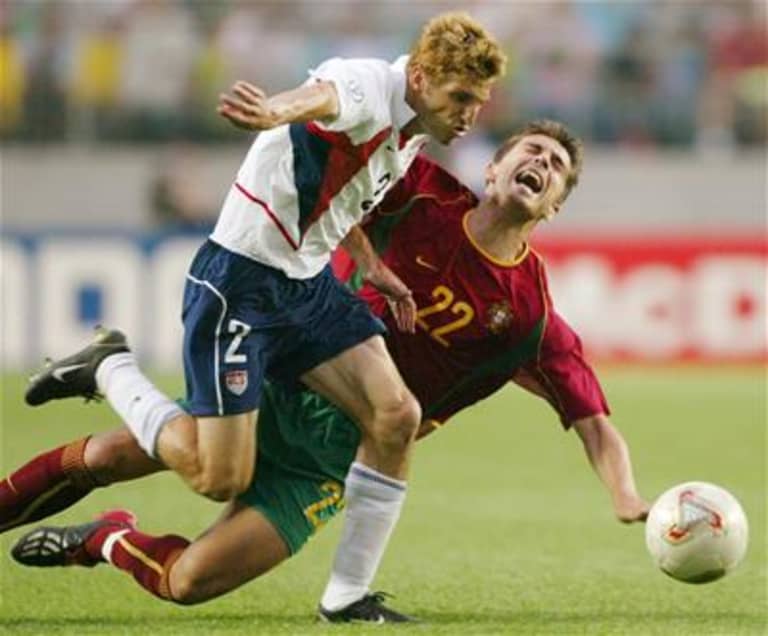
“At halftime, Bruce is emphasizing as always to push the game and understand that the result is out there,” Wolff recalls. “We have to monitor the situation, the score, the time and all these things. You have to keep playing."
He continues: “For us as Americans, there's never a moment where we don't compete or don't embrace the spirit of competition. It was about focusing and digging in to make sure the result was there for us to take.”
Facing one of the top teams in the world, the USMNT knew a 3-1 lead with 45 minutes left to play could not be taken for granted.
*
Portugal would relentlessly knock on the door from the start of the second half. Armed with the attacking prowess of Figo and Rui Costa, the Iberian nation was determined to find the net.
In the 71st minute, the United States’ lead diminished to just one when a Portuguese cross was misplayed past U.S. netminder Brad Friedel by defender Jeff Agoos to make it 3-2 via an own goal.
Over the next 19 minutes, the United States would fend off a barrage of Portugal attacks to secure the three points to kick-off its 2002 FIFA World Cup campaign – one that would be for the history books.
“We probably dodged some bullets, but based on that first half, it was a result we certainly deserved,” Wolff says. “You give up one, and it's hard. You want to stop the bleeding and they're certainly pushing for it. It's about managing the game and each little facet we can, whether it's playing in and out or slowing it down a bit. You've got to find a way to stay focused and the guys on the field did a great job. You grind away. It's not always easy at that point, but we were probably a little fortunate in some areas. We put ourselves in great areas to win it and that's what we did in the end.”
Adds Berhalter: “We knew it would be tough [after halftime]. We knew they were going to wake up and get into the game and respond, and they did. They had some chances, but we were able to hold on. I think that was the strength of that group.”
The win over Portugal remains arguably the most historic victory for the USMNT in soccer’s most prestigious tournament. With the upset, the world began to take notice.
“We knew we were a good team,” Hejduk says. “We thought we were capable of beating Portugal, but no one knows it until it happens. It happened. Three points after that first game, it gives you more momentum than ever at the World Cup.
“It gave us loads of confidence, and all of a sudden the world started noticing us.”
The victory set a precedent for the rest of the Group Stage. Confidence riding high, the U.S. earned a draw in hostile territory against host South Korea before falling to Poland in the final match of the group. However, the three points from the Portugal win and the point from South Korea saw the Yanks advance to the knockout round where it would face archrival Mexico.
“[A win in the first match] makes it a lot easier to get through,” Berhalter explains. “Bruce is really good at figuring Group Play out and he knew exactly what it took now to get us through. It made a really tough game against Korea just a little bit easier.”
Adds Hejduk: “You're already ahead of the curve [after the Portugal win]. Then it's about managing the next couple matches. We knew we'd have a tough opponent in Korea, normally the home country advances. We'd have to beat-out Portugal and Poland, who won their qualifying group in Europe and Portugal was one of the top five teams in the world.
“Our work was still cut out for us, but we were ahead of the curve after the Portugal game.”
